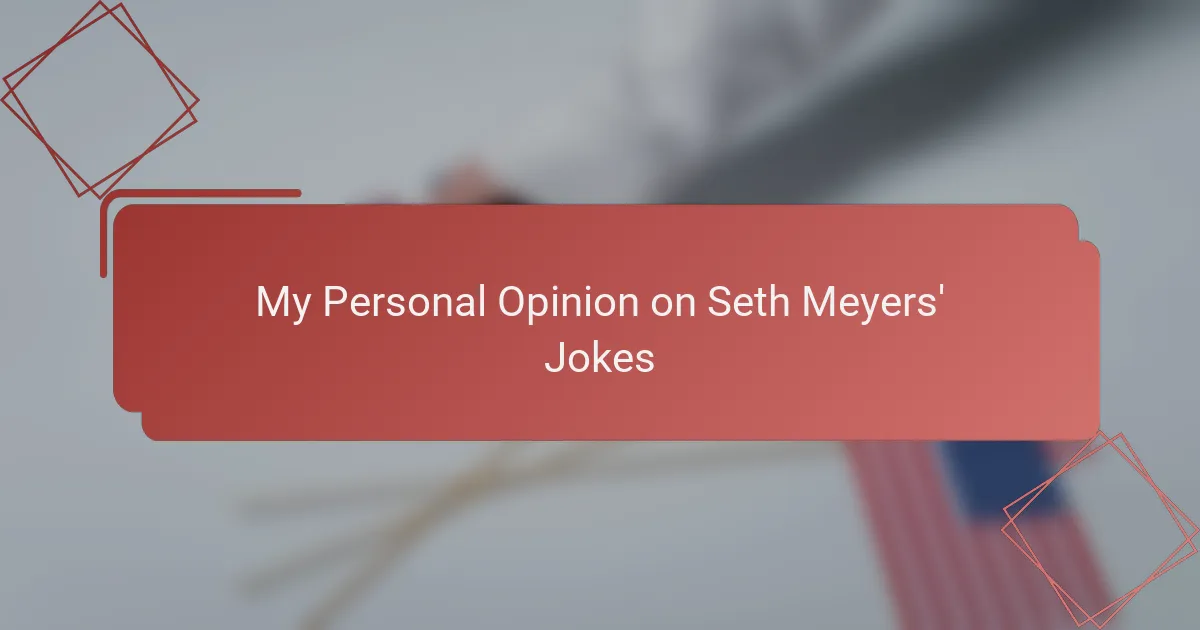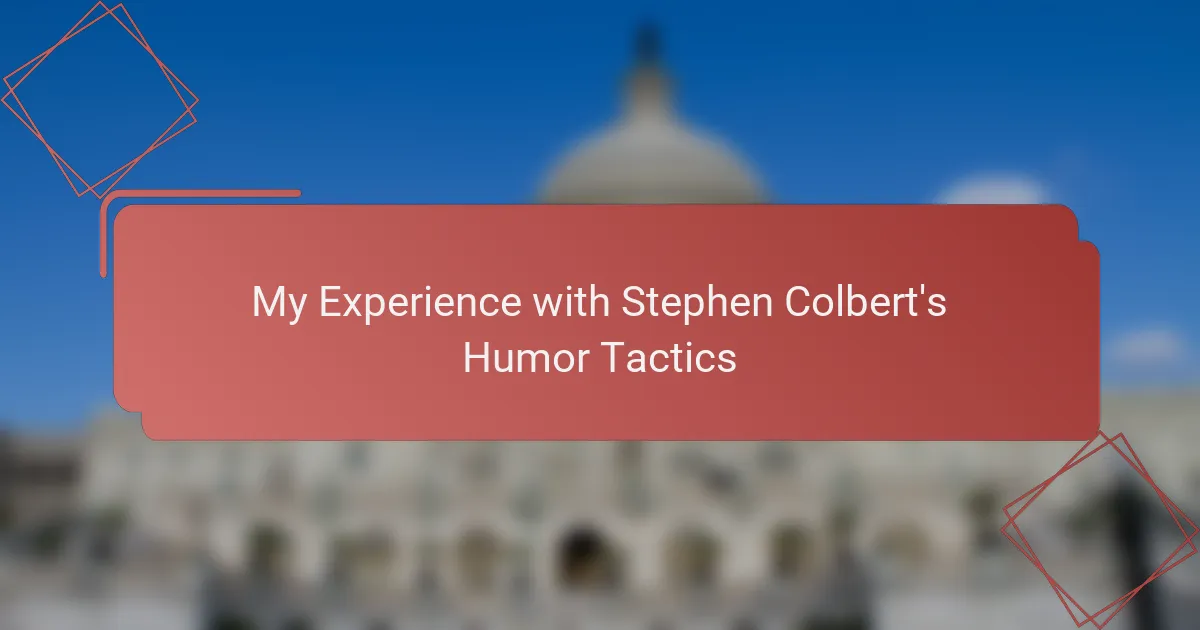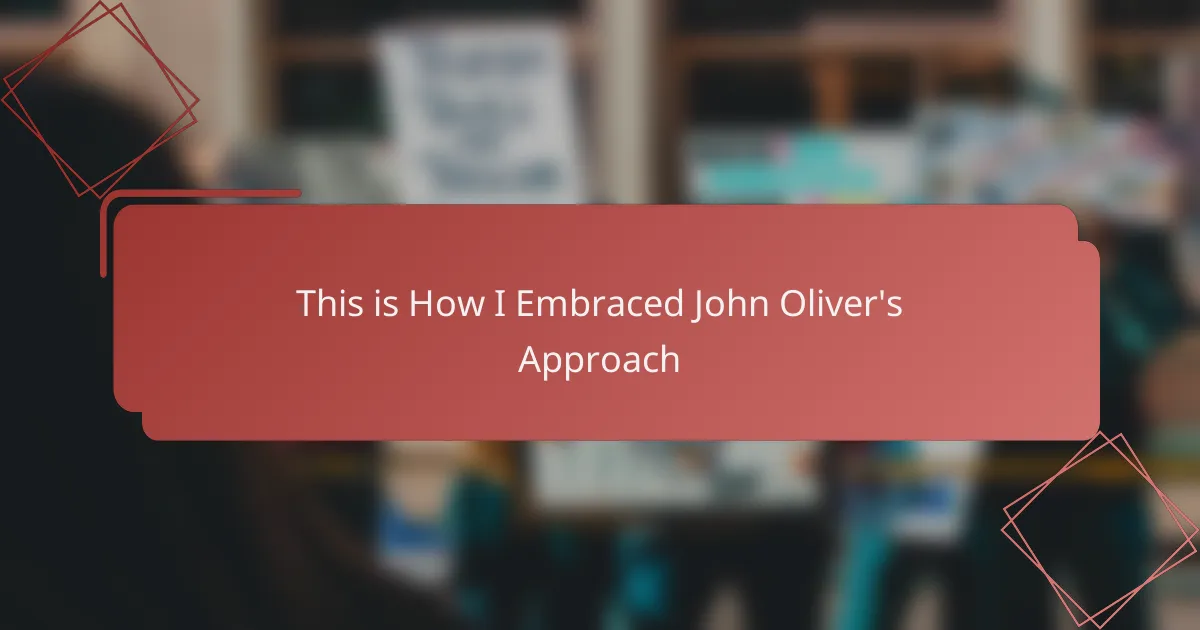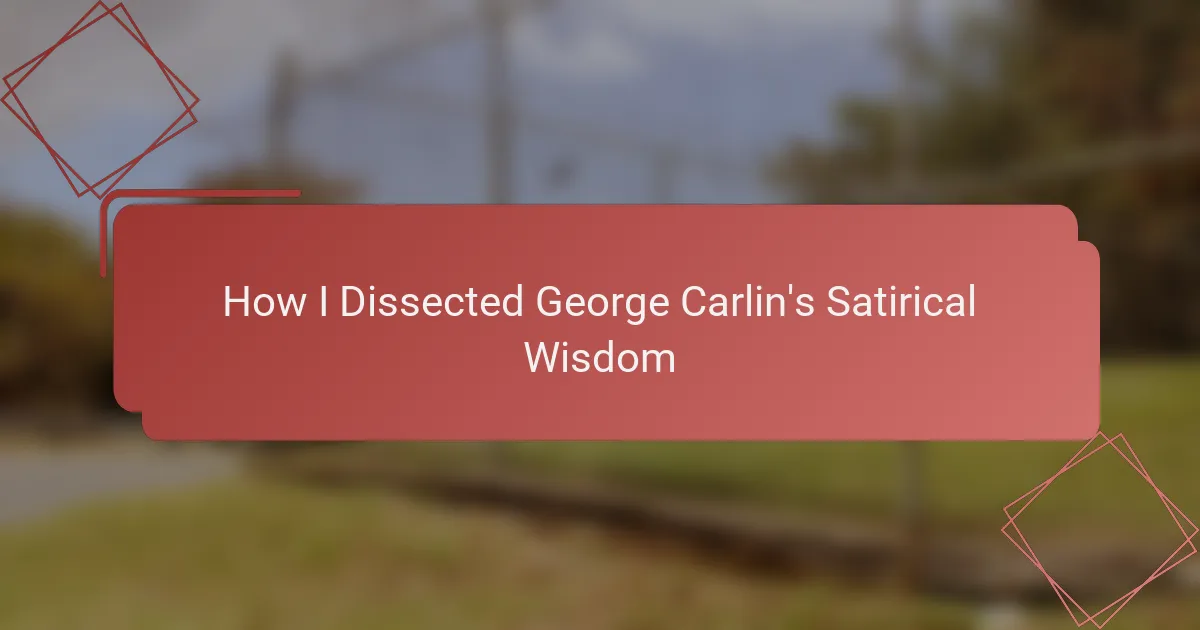Key takeaways
- Political satire uses humor to critique politics, engaging audiences and promoting critical thinking.
- Seth Meyers excels at blending intellect with relatability, making complex issues approachable through irony and relatable humor.
- Thematic focus on hypocrisy, incompetence, and polarization in politics reveals societal contradictions and encourages audience reflection.
- Effective satire balances timing, delivery, and context, making commentary on political events both humorous and thought-provoking.

Understanding Political Satire Basics
Political satire, at its core, uses humor to highlight and critique political events and figures. From my experience watching Seth Meyers, I’ve noticed how he cleverly balances sharp wit with approachable jokes, making complex political issues more understandable—and frankly, more entertaining. This approach not only informs but also encourages viewers like me to think critically without feeling overwhelmed.
| Aspect | Political Satire Basics |
|---|---|
| Purpose | To critique politics and society through humor and irony |
| Tone | Witty, often sarcastic but approachable |
| Target | Political figures, policies, public behavior |
| Effect on Audience | Engages, informs, and provokes thought with laughter |
| Example from Seth Meyers | Uses Weekend Update segment to blend humor with current political analysis |
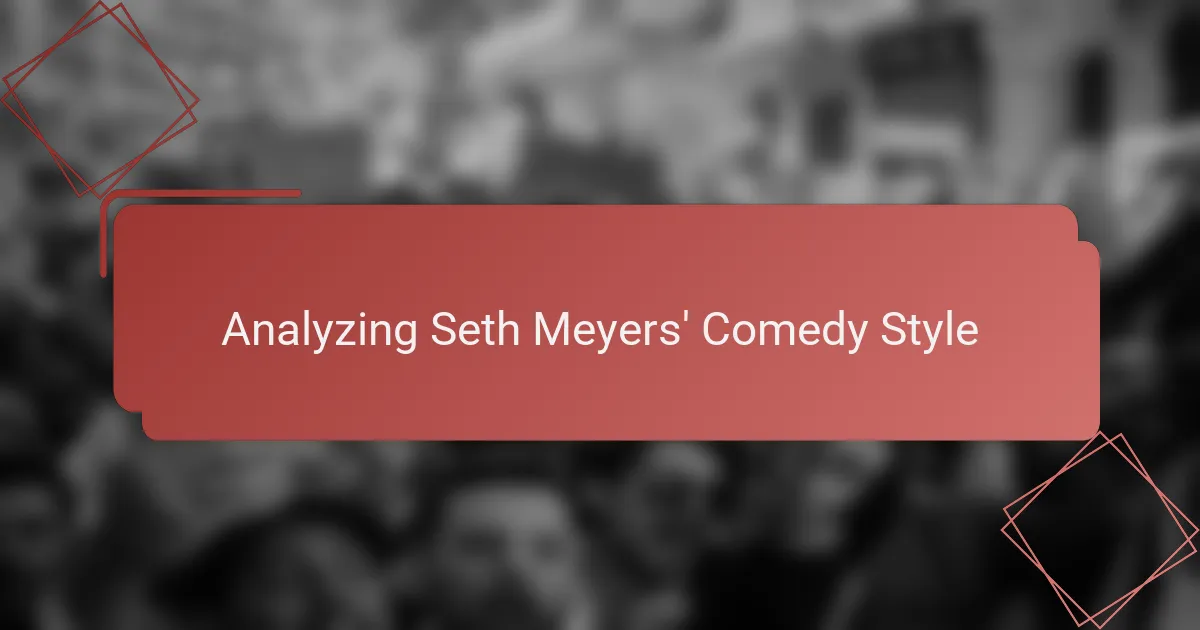
Analyzing Seth Meyers’ Comedy Style
Seth Meyers’ comedy style stands out to me because of his seamless blend of intellect and relatability. I often find myself thinking, how does he manage to tackle such serious political issues without sounding preachy? The answer, from my view, lies in his clever use of timing and tone—he delivers jokes with just the right amount of sarcasm, making complex topics feel like a conversation rather than a lecture.
What strikes me most is how he uses irony as a tool to expose contradictions in politics, yet he never loses that personal touch. I remember watching an episode where he deftly highlighted a policy blunder but followed up with a joke that felt like it was coming from a friend rather than a broadcaster. That approach creates a sense of connection, making me more receptive to his points.
I also appreciate Meyers’ skill in layering humor with information. His jokes don’t just make me laugh; they often make me pause and think—why did that fail? Or, how did that even happen? This deeper engagement shows me that his style isn’t just about laughs but about inviting the audience into a more nuanced understanding of political drama.
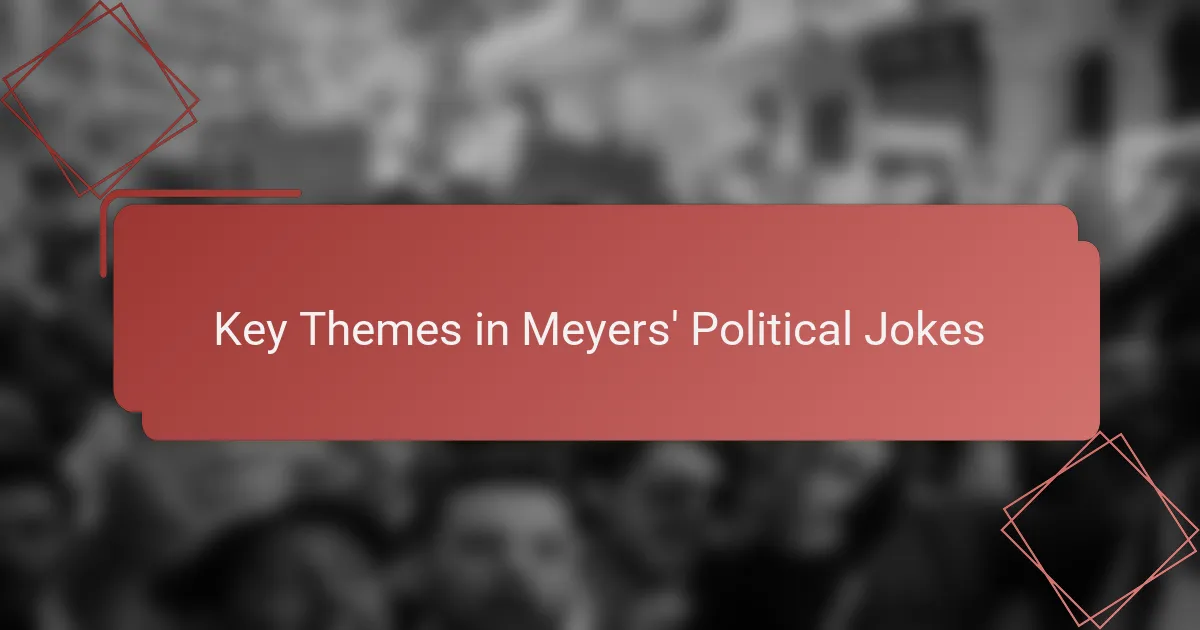
Key Themes in Meyers’ Political Jokes
One theme that really jumps out to me in Seth Meyers’ political jokes is hypocrisy. He has this sharp knack for pinpointing when politicians say one thing but do another, which, honestly, feels like calling out the elephant in the room. I remember thinking during a particular monologue—how can someone be so blatantly contradictory and still expect to be taken seriously? Meyers makes those moments impossible to ignore through wit and irony.
Another recurring theme I’ve noticed is incompetence in leadership. Meyers doesn’t just mock mistakes; he breaks down the absurdity behind them in a way that’s both hilarious and frustrating. Sometimes I find myself laughing, but also shaking my head because the reality he reflects is so disturbingly real. It’s like he’s holding up a mirror to the chaos, daring us to look a little closer.
Lastly, I can’t help but appreciate how Meyers often tackles polarization and division in politics. He cleverly exposes the ridiculousness of extreme partisanship, making me question what we’ve allowed our political discourse to become. Have we really accepted this level of discord as normal? His humor makes me confront these tough questions without feeling attacked, which I think is a real gift in today’s climate.
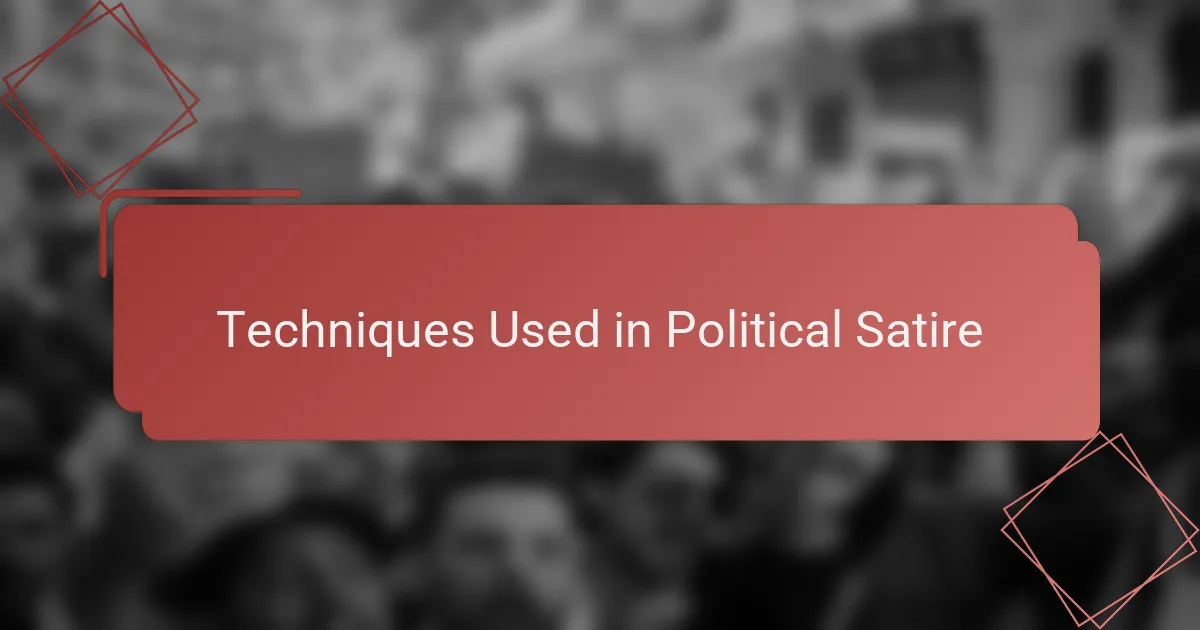
Techniques Used in Political Satire
What I find particularly effective in political satire—and Seth Meyers uses this brilliantly—is exaggeration. By taking real political actions or statements and amplifying their absurdity, he not only gets laughs but also forces me to see the ridiculousness that might otherwise go unnoticed. Have you ever caught yourself laughing and then suddenly realizing, “Wait, this is actually happening?” That’s the power of this technique.
Another technique Meyers relies on heavily is irony. It’s that sharp twist where what’s said is the opposite of what’s meant or expected. From my perspective, irony cuts through political doublespeak and reveals uncomfortable truths. When he points out contradictions between politicians’ words and actions, I can’t help but feel both amused and a bit exasperated—like, how did this even slip past the public unchallenged for so long?
I also appreciate his use of juxtaposition—putting two contrasting ideas or images side by side to highlight political hypocrisy or folly. For example, setting a lofty political promise next to a messy reality creates a comedic tension that’s impossible to ignore. It makes me rethink the narrative politicians try to sell and question whether the polished rhetoric matches the truth underneath. Have you noticed how these stark comparisons make the satire hit home even harder?
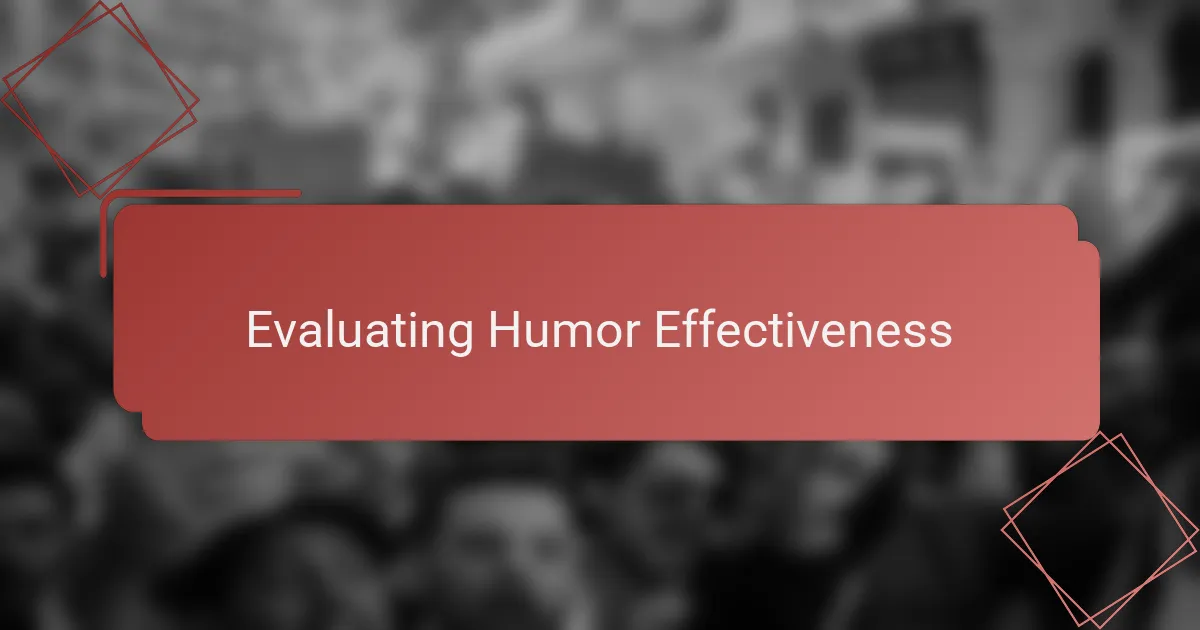
Evaluating Humor Effectiveness
When I think about evaluating humor effectiveness, what really matters to me is whether the jokes land consistently and provoke a genuine reaction—laughs, surprise, or even thoughtful nods. Seth Meyers’ humor often strikes that balance; I’ve caught myself laughing out loud but also reflecting on the gravity behind the punchlines. Isn’t that the hallmark of good political satire—making you chuckle and think simultaneously?
Another thing I notice is how timing and delivery influence how effective a joke is. From my experience, Meyers’ measured pace and confident tone make the humor feel natural, never rushed or forced. Have you ever heard a joke that felt too rehearsed or awkward? Meyers avoids that trap, which keeps me engaged and open to his political critique.
Lastly, I believe context plays a huge role in judging humor’s success. A joke might be hilarious in one moment but fall flat in another depending on recent events or the audience’s mood. I remember watching Meyers react quickly to breaking news with a sharp quip that felt perfectly timed—it elevated the humor and made the satire more potent. This adaptability is, to me, a key ingredient in what makes his political jokes hit the mark.
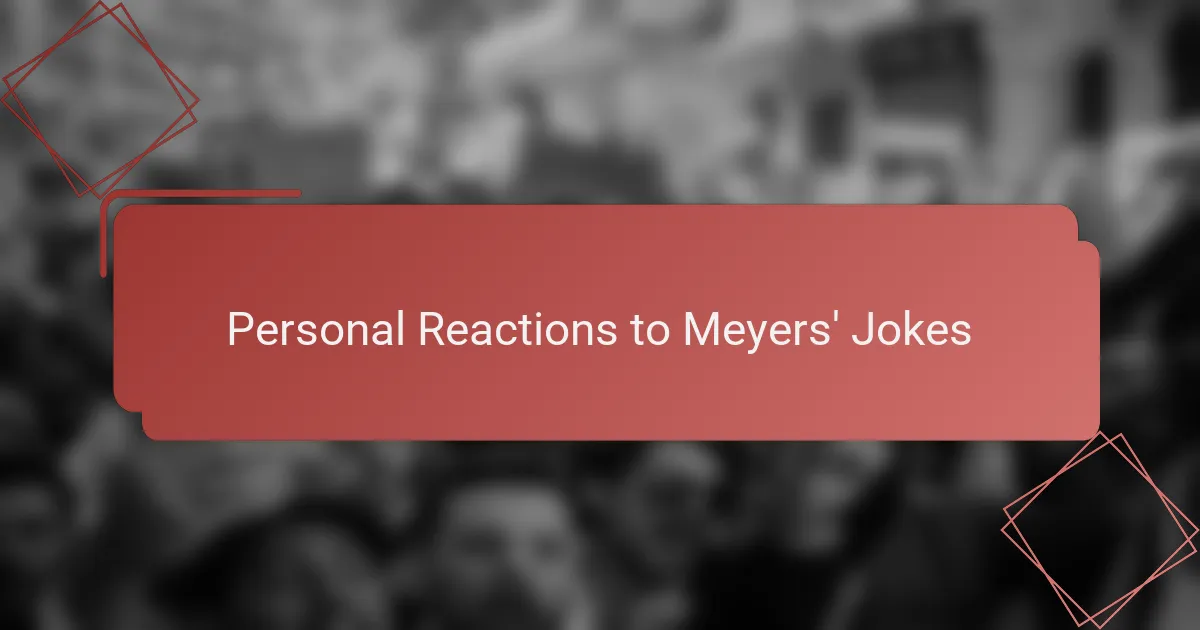
Personal Reactions to Meyers’ Jokes
My reaction to Seth Meyers’ jokes is often mixed but mostly positive. I find his sharp wit and clever wordplay refreshing, especially when he tackles complex political issues with humor that makes me think and laugh at the same time. Sometimes, his jokes hit me on a personal level, reminding me of the absurdity in some political events I’ve closely followed, which adds a layer of emotional engagement for me.
What stands out most to me is how Meyers uses satire not just to entertain but to challenge his audience. I’ve noticed that his humor tends to balance sarcasm with insightful critique, which can provoke both a smile and deep reflection. This combination makes his jokes memorable and impactful, something I appreciate in political satire.
| Aspect | Personal Reaction |
|---|---|
| Wit and Wordplay | Refreshing and thought-provoking |
| Emotional Connection | Engages with real political absurdities |
| Satirical Tone | Balances sarcasm with insightful critique |
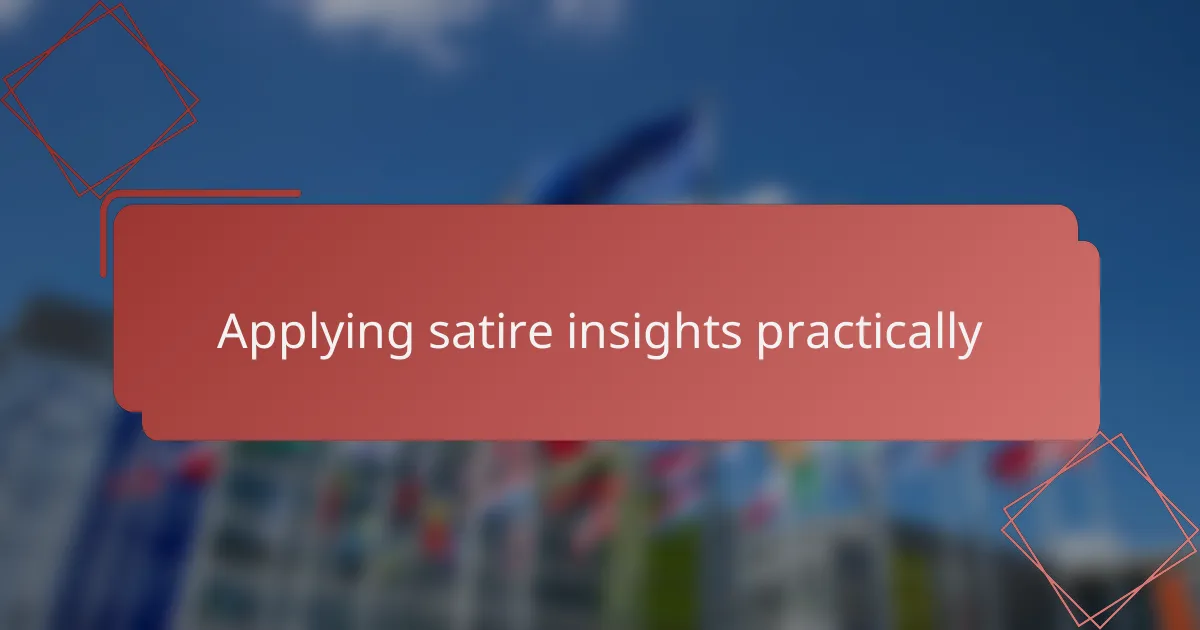
Applying Satire Insights Practically
Applying satire insights practically means using the sharp wit and clever critiques from Seth Meyers’ jokes to better understand political narratives around us. From my experience, breaking down his humor helps me recognize bias and irony in everyday political discussions, making me more thoughtful and less reactive. It’s like having a toolkit that sharpens your perspective in a world full of complex, often contradictory messages.
| Aspect | Practical Application |
|---|---|
| Seth Meyers’ Use of Irony | Encourages critical thinking by highlighting contradictions in politics, helping me question statements rather than taking them at face value. |
| Topical Humor | Keeps me informed and engaged with current events, making it easier to join conversations with a nuanced viewpoint. |
| Emotional Connection | His relatable style helps me feel connected rather than alienated, turning complex political satire into accessible insights. |
